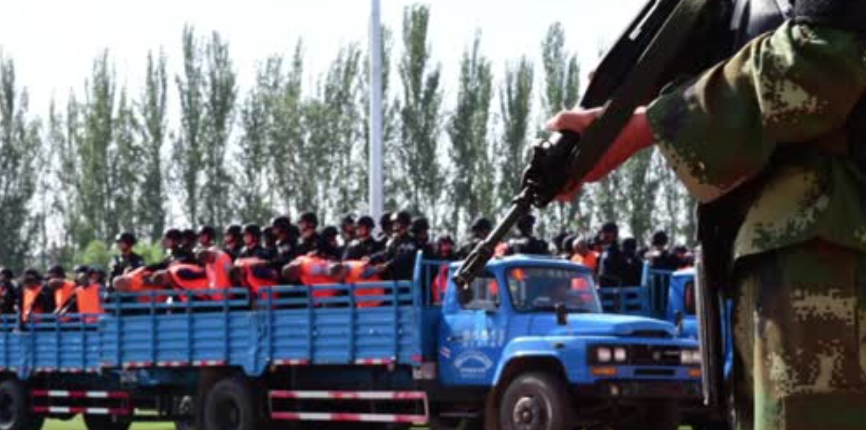The Telegraph’s Tom Phillips reports from Yining in Xinjiang on China’s response to attacks that have killed more than 70 people in the past 10 months.
Armed troops have flooded the city centre, mounting roadblocks and metal barricades at all major intersections, and petrol stations have been sealed off with red and white metal blockades.
Bag checks are now compulsory at restaurants, shops have been ordered to close early and cars are not allowed within 650ft of schools. Yining’s civilian population has also been recruited to the “people’s war”, with thousands joining a volunteer army of “red guards” given the task of searching cars and snitching on suspect locals.
[…] Schools have introduced “anti-evil religion” classes for tens of thousands of students and staged song and dance contests featuring routines entitled Hello, Motherland!, Sing out loud about ethnic unity! and Who says our homeland isn’t great?
[…] Yining’s journalists have also joined the government’s campaign, with editors publicly pledging to engage in anti-terrorist “opinion guidance” and using their pages to build “iron walls of social stability”. [Source]
Local authorities in Xinjiang have been accused by exile group the World Uyghur Congress of “racing” each other to convict Uyghurs on terrorism and other charges. More established restrictions continue, including a ban on Ramadan fasting by officials, teachers and students.
The anti-terror campaign has been felt to lesser degrees elsewhere in China: for example, in new, super-resilient traffic barriers in central Beijing, and the rearming of some police, which has prompted safety fears after at least four fatal shootings.
Meanwhile, The Los Angeles Times’ Tommy Yang and Julie Makinen report that a string of recent bus arsons has added to public unease:
In a span of 10 days, three buses have been set ablaze in busy metropolitan areas, leaving two people dead and 72 injured. The suspects seemed to carry no political or ethnic grudges. Instead, they all are said to be isolated young men struggling with such mundane problems as money woes and lack of hope for a prosperous future.
[…] “None of them committed any crime prior to launching these attacks,” [Yang Shu, a counterterrorism expert at Lanzhou University] said. “This makes it very hard to identify who is likely to carry out the next attack as there are so many people with similar grievances in China today.”
[… With] increased security measures failing to prevent the recent arson attacks, the public is calling for additional steps to ensure the safety bus passengers. Many cities are starting to add a security officer on every bus. But Yang, the security expert, was skeptical such efforts would work.
“The cost is simply too high to have such a person on every bus in the country,” he said. “It’s better to improve our social structure to make less people face such situations in their lives.” [Source]
[Correction: this post originally misattributed the first report quoted to The Telegraph’s Malcolm Moore instead of Tom Phillips.]








